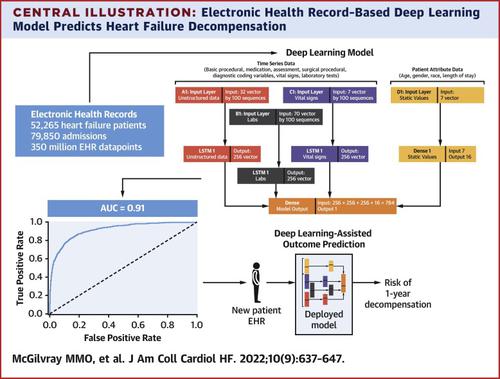JACC: Heart Failure ( IF 10.3 ) Pub Date : 2022-07-06 , DOI: 10.1016/j.jchf.2022.05.010 Martha M O McGilvray 1 , Jeffrey Heaton 2 , Aixia Guo 3 , M Faraz Masood 1 , Brian P Cupps 1 , Marci Damiano 1 , Michael K Pasque 1 , Randi Foraker 4

|
Background
Surgical mechanical ventricular assistance and cardiac replacement therapies, although life-saving in many heart failure (HF) patients, remain high-risk. Despite this, the difficulty in timely identification of medical therapy nonresponders and the dire consequences of nonresponse have fueled early, less selective surgical referral. Patients who would have ultimately responded to medical therapy are therefore subjected to the risk and life disruption of surgical therapy.
Objectives
The purpose of this study was to develop deep learning models based upon commonly-available electronic health record (EHR) variables to assist clinicians in the timely and accurate identification of HF medical therapy nonresponders.
Methods
The study cohort consisted of all patients (age 18 to 90 years) admitted to a single tertiary care institution from January 2009 through December 2018, with International Classification of Disease HF diagnostic coding. Ensemble deep learning models employing time-series and densely-connected networks were developed from standard EHR data. The positive class included all observations resulting in severe progression (death from any cause or referral for HF surgical intervention) within 1 year.
Results
A total of 79,850 distinct admissions from 52,265 HF patients met observation criteria and contributed >350 million EHR datapoints for model training, validation, and testing. A total of 20% of model observations fit positive class criteria. The model C-statistic was 0.91.
Conclusions
The demonstrated accuracy of EHR-based deep learning model prediction of 1-year all-cause death or referral for HF surgical therapy supports clinical relevance. EHR-based deep learning models have considerable potential to assist HF clinicians in improving the application of advanced HF surgical therapy in medical therapy nonresponders.
中文翻译:

基于电子健康记录的深度学习预测心力衰竭患者的死亡或严重失代偿
背景
外科机械心室辅助和心脏替代疗法虽然可以挽救许多心力衰竭 (HF) 患者的生命,但仍然存在高风险。尽管如此,及时识别药物治疗无反应者的困难以及无反应的可怕后果推动了早期、选择性较少的手术转诊。因此,最终会对药物治疗产生反应的患者面临手术治疗的风险和生命中断。
目标
本研究的目的是开发基于常用电子健康记录 (EHR) 变量的深度学习模型,以帮助临床医生及时准确地识别 HF 药物治疗无反应者。
方法
研究队列由 2009 年 1 月至 2018 年 12 月期间入住单一三级医疗机构的所有患者(年龄 18 至 90 岁)组成,采用国际疾病分类 HF 诊断编码。使用时间序列和密集连接网络的集成深度学习模型是从标准 EHR 数据开发的。阳性类别包括在 1 年内导致严重进展(因任何原因死亡或转诊接受 HF 手术干预)的所有观察结果。
结果
来自 52,265 名 HF 患者的总共 79,850 名不同入院符合观察标准,并为模型训练、验证和测试贡献了超过 3.5 亿个 EHR 数据点。共有 20% 的模型观测符合正类标准。模型 C 统计量为 0.91。
结论
基于 EHR 的深度学习模型预测 1 年全因死亡或 HF 手术治疗转诊的准确性支持临床相关性。基于 EHR 的深度学习模型在帮助 HF 临床医生改进先进的 HF 手术治疗在药物治疗无反应者中的应用方面具有相当大的潜力。











































 京公网安备 11010802027423号
京公网安备 11010802027423号